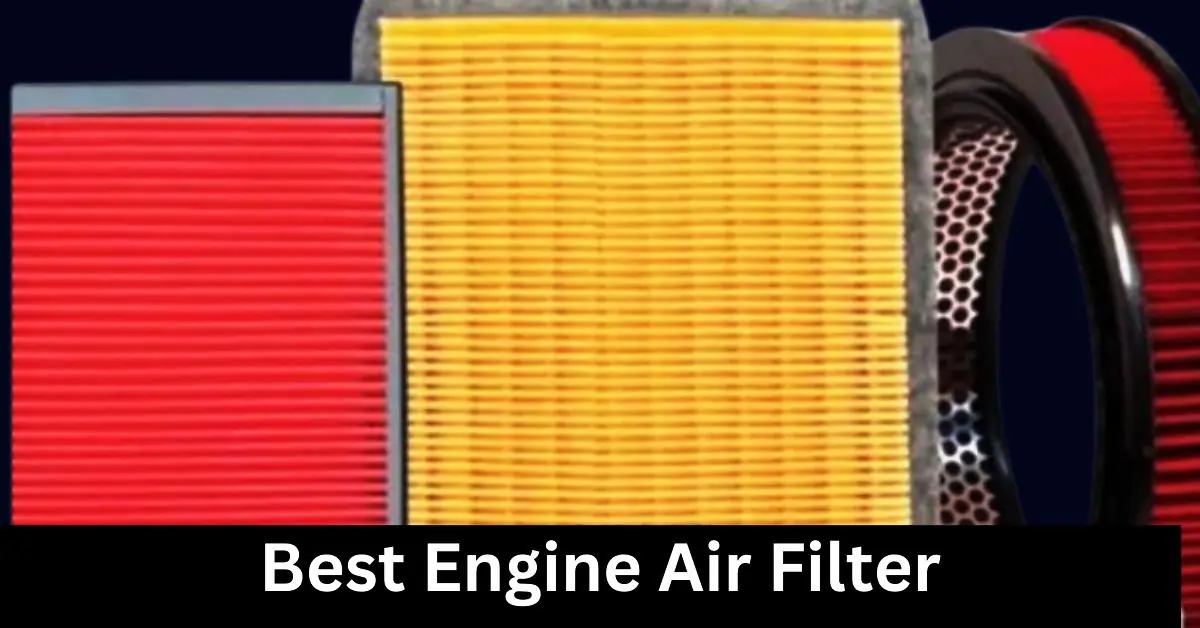Engine Air Filter
Clean air isn’t just vital for your health—it’s essential for your engine’s performance too. Just as you wouldn’t breathe in polluted air, your engine shouldn’t either. Engine air filters play a critical role in keeping dirt, dust, and debris out of your engine, ensuring it runs smoothly and efficiently. A clean air filter doesn’t just enhance performance; it also prolongs the life of your engine and improves fuel efficiency.
In this guide, we’ll explore the top 24 engine air filters of 2024, helping you make an informed decision for your vehicle. Whether you’re looking for durability, performance, or value for money, this comprehensive buying guide will navigate you through the best options available, ensuring your engine breathes clean air and performs at its best.
Why Engine Air Filters Matter
How Engine Air Filters Work
Engine air filters play a crucial role in your vehicle’s performance by ensuring that clean air reaches the engine. They are designed to trap dirt, dust, and other contaminants from the air before it enters the engine. By filtering out these particles, the air filter prevents them from causing wear and tear on engine components, ensuring smooth operation. In essence, the air filter acts as the engine’s first line of defense, maintaining the quality of the air that mixes with fuel for combustion.
Impact on Performance
A clean air filter is vital for optimal engine performance. When the air filter is free from obstructions, it allows the right amount of air to mix with the fuel, leading to efficient combustion. This not only enhances fuel efficiency but also supports engine longevity by reducing the strain on internal components. Moreover, a clean air filter contributes to lower emissions, as the engine burns fuel more completely. In contrast, a clogged or dirty air filter restricts airflow, leading to poor fuel economy, reduced power, and potential engine damage over time.
Signs of a Bad Air Filter
Recognizing when it’s time to replace your air filter is essential for maintaining your vehicle’s health. Common signs of a bad air filter include reduced fuel efficiency, noticeable loss of power during acceleration, unusual engine sounds, and a check engine light on your dashboard. Additionally, if you notice a black, sooty residue around the filter or increased exhaust smoke, these could be indicators that your air filter is no longer functioning properly. Regular inspection and timely replacement of the air filter are key to ensuring your engine continues to perform at its best.
Key Formulas for Engine Air Filter Performance
1. Air Filter Efficiency
This formula calculates the efficiency of an air filter in capturing particles.

2. Pressure Drop Across the Filter
This formula measures the resistance to airflow caused by the air filter.
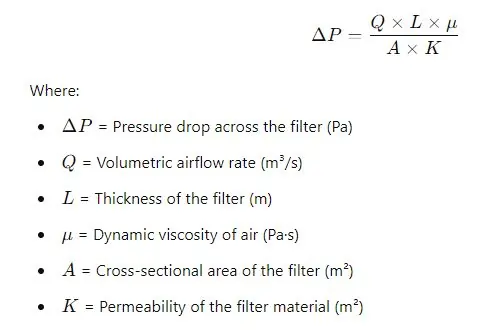
3. Airflow Rate Through the Filter
This formula calculates the airflow rate through the air filter, which is crucial for engine performance.
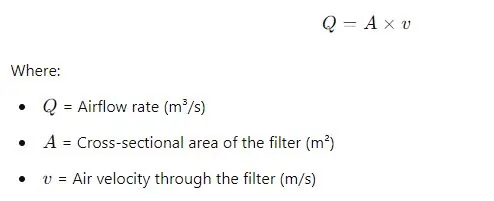
4. Mass Flow Rate of Air
This formula determines the mass flow rate of air entering the engine, which depends on the filter’s efficiency.
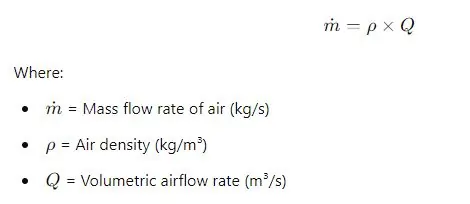
5. Filter Service Life
This formula estimates the expected service life of the air filter based on contaminant loading.
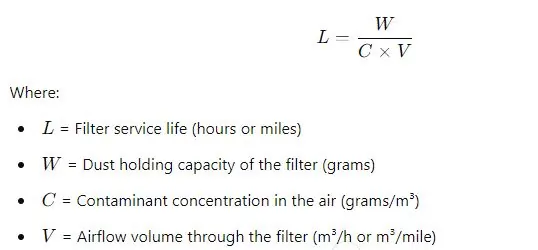
Types of Engine Air Filters

Choosing the right engine air filter is essential for maintaining your vehicle’s performance and longevity. There are several types of air filters available, each offering unique benefits depending on your driving needs and conditions.
Paper Air Filters

Pros: Paper air filters are the most commonly used type and are known for their affordability and ease of replacement. They provide adequate filtration for everyday driving conditions, effectively trapping dust and debris.
Cons: However, paper filters are not reusable, and their filtration efficiency may decrease quickly in dusty or harsh environments. They need to be replaced more frequently than other types.
Best For: Typical users who prioritize cost-effectiveness and who drive under normal conditions will find paper air filters to be a suitable choice.
Foam Air Filters
Durability and Performance: Foam air filters are designed for durability and are highly effective in extreme conditions, such as off-road driving or in environments with high levels of dust and dirt. Their thick, porous structure allows for excellent filtration while maintaining airflow.
Cons: Foam filters can be more challenging to clean and maintain, and they may require regular oiling to maintain their filtration efficiency.
Best For: Drivers who frequently operate their vehicles in extreme or off-road conditions will benefit from the robust performance and durability of foam air filters.
Cotton Gauze Air Filters
Benefits: Cotton gauze air filters are known for their high airflow and are reusable, making them a popular choice for high-performance vehicles. These filters can be washed and reused multiple times, providing long-term savings and consistent performance.
Cons: They require regular maintenance, including cleaning and oiling, to ensure they remain effective. Additionally, they are typically more expensive upfront compared to paper filters.
Best For: High-performance vehicles and drivers who seek reusable options with superior airflow will find cotton gauze air filters to be an excellent investment.
Synthetic Air Filters
Advanced Filtration and Longevity: Synthetic air filters offer advanced filtration capabilities, often outperforming paper and cotton filters in capturing smaller particles. They also provide longer service life and are less prone to degradation over time.
Cons: Synthetic filters are generally more expensive and may not be reusable, depending on the specific product.
Best For: Drivers who prioritize long-term durability and the highest level of filtration efficiency will benefit from choosing synthetic air filters.
OEM vs. Aftermarket
Considerations: When selecting an air filter, it’s important to consider whether to choose an OEM (Original Equipment Manufacturer) or an aftermarket option. OEM filters are designed specifically for your vehicle and ensure a perfect fit and performance. However, they can be more expensive.
Aftermarket filters: offer a broader range of options, often at a lower cost, and may provide enhanced performance or longevity. However, they vary widely in quality, so it’s essential to choose a reputable brand.
Best For: If you prefer guaranteed compatibility and reliability, OEM filters are the way to go. For those looking for cost savings or specialized performance enhancements, a well-chosen aftermarket filter can be a great alternative.
Top 24 Engine Air Filters of 2024: Pros, Cons & Best Uses
K&N High-Performance Air Filter
- Description: Reusable cotton gauze filter that enhances airflow and engine performance.
- Pros: Reusable, excellent airflow, enhanced performance.
- Cons: Higher initial cost, requires maintenance.
- Ideal Use Case: High-performance vehicles, drivers seeking long-term savings.
Bosch Workshop Engine Air Filter
- Description: Affordable paper filter providing reliable filtration for everyday use.
- Pros: Affordable, reliable, easy to replace.
- Cons: Not reusable, basic performance.
- Ideal Use Case: Everyday commuting, budget-conscious users.
FRAM Extra Guard Air Filter
- Description: High-quality paper filter designed for extra dust-holding capacity.
- Pros: Extra dust-holding capacity, affordable.
- Cons: Not reusable, basic filtration.
- Ideal Use Case: Dusty environments, budget-conscious users.
Mann-Filter CUK Activated Carbon Air Filter
- Description: Activated carbon filter that removes odors and gases from the air.
- Pros: Removes odors, high filtration efficiency.
- Cons: Higher cost, not reusable.
- Ideal Use Case: Urban areas with air quality concerns.
ACDelco Professional Air Filter
- Description: OEM quality filter offering high filtration efficiency.
- Pros: High efficiency, OEM quality, durable.
- Cons: Slightly higher cost.
- Ideal Use Case: OEM replacement for general use.
EPAuto High Flow Engine Air Filter
- Description: Affordable and efficient, designed for high airflow and filtration.
- Pros: Affordable, high airflow, good filtration.
- Cons: Not reusable, basic quality.
- Ideal Use Case: Budget-conscious users needing good performance.
AEM DryFlow Air Filter
- Description: Synthetic media filter that provides excellent filtration without oiling.
- Pros: No oiling required, excellent filtration, durable.
- Cons: Higher cost, not reusable.
- Ideal Use Case: High-performance vehicles, drivers avoiding oil-based filters.
S&B Cold Air Intake Filter
- Description: Premium cotton gauze filter, ideal for cold air intakes.
- Pros: Enhanced performance, reusable, high airflow.
- Cons: Expensive, requires maintenance.
- Ideal Use Case: Performance enthusiasts using cold air intakes.
Purolator ONE Advanced Engine Air Filter
- Description: High-capacity filter with multi-fiber layers for enhanced filtration.
- Pros: High capacity, multi-fiber layers, durable.
- Cons: Higher cost, not reusable.
- Ideal Use Case: Heavy commuters in dusty environments.
WIX XP Engine Air Filter
- Description: Heavy-duty filter designed for extreme driving conditions.
- Pros: Designed for extreme conditions, heavy-duty.
- Cons: More expensive than standard filters.
- Ideal Use Case: Off-road or extreme driving conditions.
Motorcraft OEM Air Filter
- Description: OEM filter providing excellent fit and filtration for Ford vehicles.
- Pros: OEM fit, reliable filtration, durable.
- Cons: OEM-specific, higher cost.
- Ideal Use Case: Ford vehicle owners needing OEM quality.
Spectre Performance Air Filter
- Description: Washable and reusable performance filter for enhanced airflow.
- Pros: Washable, reusable, performance boost.
- Cons: Higher cost, requires maintenance.
- Ideal Use Case: Performance-focused drivers looking for reusable options.
Hastings Premium Engine Air Filter
- Description: Premium filter providing reliable filtration and durability.
- Pros: Reliable, durable, good filtration.
- Cons: Not reusable, slightly more expensive.
- Ideal Use Case: General use, reliability-focused drivers.
Green High Performance Air Filter
- Description: High-flow filter made with cotton for performance-focused drivers.
- Pros: High airflow, reusable, performance-focused.
- Cons: Higher cost, requires maintenance.
- Ideal Use Case: Performance enthusiasts seeking high airflow.
AFE Power MagnumFLOW Air Filter
- Description: Advanced synthetic media filter for maximum airflow.
- Pros: Maximum airflow, durable, reusable.
- Cons: Expensive, requires maintenance.
- Ideal Use Case: Performance-focused drivers, heavy commuters.
STP Premium Engine Air Filter
- Description: Budget-friendly filter offering good filtration and airflow.
- Pros: Budget-friendly, good filtration.
- Cons: Basic performance, not reusable.
- Ideal Use Case: Budget-conscious drivers needing good performance.
Royal Purple High-Performance Air Filter
- Description: High-performance synthetic filter designed for maximum power.
- Pros: High-performance, maximum power, durable.
- Cons: Expensive, requires maintenance.
- Ideal Use Case: Performance enthusiasts seeking maximum power.
Denso Air Filter
- Description: Reliable OEM filter offering good filtration and fit.
- Pros: Reliable, OEM fit, good filtration.
- Cons: Not reusable, basic quality.
- Ideal Use Case: Toyota vehicle owners needing OEM quality.
Mahle Original Air Filter
- Description: OEM-grade filter providing excellent filtration and durability.
- Pros: OEM quality, durable, good filtration.
- Cons: Not reusable, OEM-specific.
- Ideal Use Case: OEM replacement for general use.
Champion Premium Engine Air Filter
- Description: Affordable filter offering good filtration and protection.
- Pros: Affordable, good protection, reliable.
- Cons: Basic performance, not reusable.
- Ideal Use Case: Budget-conscious drivers needing basic performance.
Baldwin Engine Air Filter
- Description: Heavy-duty filter designed for commercial and industrial vehicles.
- Pros: Heavy-duty, durable, excellent filtration.
- Cons: Higher cost, not reusable.
- Ideal Use Case: Commercial vehicles, heavy-duty applications.
Mishimoto Performance Air Filter
- Description: High-performance filter designed for tuned and high-power engines.
- Pros: Designed for high-power engines, reusable.
- Cons: Expensive, requires maintenance.
- Ideal Use Case: Tuned vehicles, high-performance engines.
Volant Pro-5 Air Filter
- Description: Multi-layered filter offering enhanced dust-holding capacity.
- Pros: Enhanced dust capacity, durable.
- Cons: Higher cost, not reusable.
- Ideal Use Case: Heavy commuters in dusty environments.
Airaid Premium Air Filter
- Description: Premium washable and reusable filter with superior airflow.
- Pros: Superior airflow, reusable, washable.
- Cons: Expensive, requires maintenance.
- Ideal Use Case: Performance-focused drivers seeking reusable options.
How to Choose the Right Air Filter for Your Vehicle
Selecting the correct air filter for your vehicle is crucial to maintaining optimal engine performance and longevity. Here’s a guide to help you make an informed decision based on compatibility, driving conditions, maintenance needs, and budget considerations.
Vehicle Compatibility
How to Check if the Filter Fits Your Car: The first step in choosing the right air filter is ensuring it fits your vehicle’s make and model. Start by consulting your vehicle’s owner manual, which will specify the exact dimensions and type of air filter required. You can also check compatibility by using online tools provided by manufacturers or retailers, where you can input your car’s details to find matching filters. Ensuring a proper fit is critical as an incorrect filter can lead to poor filtration, reduced engine performance, and potential damage.
Driving Conditions
Selecting an Air Filter Based on Where and How You Drive: Your driving environment significantly influences the type of air filter you should choose. If you drive primarily in urban areas with heavy traffic and pollution, or if you frequently navigate dusty or off-road terrains, you’ll need a filter that can handle high levels of contaminants. In such cases, a high-capacity or performance-oriented filter like foam or cotton gauze may be ideal. On the other hand, if your driving is limited to clean, paved roads in suburban or rural areas, a standard paper or synthetic filter may be sufficient to meet your needs.
Maintenance and Replacement Frequency
Tips on How Often to Replace or Clean Your Air Filter: Regular maintenance is key to keeping your air filter—and by extension, your engine—in top condition. Generally, air filters should be replaced every 12,000 to 15,000 miles, but this can vary based on the type of filter and driving conditions. For example, reusable filters like cotton gauze need to be cleaned and re-oiled according to the manufacturer’s recommendations, typically every 15,000 miles or after heavy use. Foam filters also require regular cleaning and oiling, especially in dusty environments. Always inspect your air filter during routine vehicle maintenance and replace it promptly if it appears dirty or clogged.
Budget Considerations
Balancing Cost with Performance Needs: Your budget will play a significant role in selecting an air filter, but it’s important to balance cost with performance. Paper filters are the most economical option but require frequent replacement. Reusable filters, such as those made from cotton gauze, have a higher initial cost but can save money over time by reducing the need for frequent replacements. Synthetic filters strike a balance between cost and longevity, offering advanced filtration without the need for oiling or frequent changes. Consider your driving habits and how much you’re willing to spend upfront versus long-term when making your decision.
Installation Tips and Best Practices
Proper installation of your engine air filter is crucial to ensuring your vehicle operates efficiently and remains protected from harmful contaminants. Whether you choose to install the filter yourself or seek professional help, following best practices can make a significant difference in performance and longevity.
DIY vs. Professional Installation
When to Consider Professional Help: Replacing an air filter is generally a straightforward task that most vehicle owners can handle on their own. However, there are situations where professional installation might be worth considering. If your vehicle has a complex engine layout, or if you’re unsure about accessing or replacing the air filter, a professional mechanic can ensure the job is done correctly. Additionally, if you are using a high-performance or specialized air filter, professional installation can help avoid issues related to improper fit or sealing, which could compromise your engine’s performance.
Step-by-Step Installation Guide
Simple Instructions for Replacing Your Air Filter at Home:
- Locate the Air Filter Housing: Open your vehicle’s hood and locate the air filter housing. This is typically a rectangular or cylindrical box near the top of the engine. Consult your vehicle’s manual if you’re unsure where to find it.
- Open the Air Filter Housing: Depending on your vehicle, the housing may be secured with screws, clips, or clamps. Carefully remove these to access the air filter inside.
- Remove the Old Air Filter: Take out the old air filter, noting its orientation within the housing. This will help ensure you install the new filter correctly.
- Inspect the Housing: Before installing the new filter, check the inside of the housing for any dirt or debris. Clean it out using a soft cloth or vacuum if necessary.
- Install the New Air Filter: Place the new air filter into the housing, ensuring it sits correctly and matches the orientation of the old filter. The filter should fit snugly within the housing without gaps.
- Secure the Housing: Replace the cover and secure it with the screws, clips, or clamps you removed earlier. Make sure the housing is tightly sealed to prevent unfiltered air from entering the engine.
- Double-Check Your Work: Once installed, give everything a final inspection to ensure the filter is properly seated and the housing is securely fastened.
Common Mistakes to Avoid
Tips to Ensure a Proper Fit and Seal:
- Incorrect Filter Size: Always verify that you have the correct air filter size for your vehicle. An incorrect size can lead to poor sealing, allowing unfiltered air to bypass the filter.
- Improper Installation Orientation: Ensure the air filter is installed in the correct orientation. Many filters have a specific direction for airflow, and installing them incorrectly can reduce efficiency and filtration.
- Not Cleaning the Housing: Neglecting to clean the air filter housing before installation can lead to contaminants being introduced into the engine, negating the benefits of a new filter.
- Overtightening or Undertightening the Housing: When securing the air filter housing, avoid overtightening, which can damage the housing or filter. Conversely, undertightening can result in a loose seal, allowing dirt and debris to enter the engine.
- Ignoring Maintenance Schedule: Failing to replace or clean the air filter at recommended intervals can lead to a clogged filter, reducing engine performance and fuel efficiency.
FAQs on Engine Air Filter
Q- How often should I replace my engine air filter?
A- Replace every 12,000 to 15,000 miles, or sooner in harsh conditions.
Q- Can a dirty air filter affect fuel efficiency?
A- Yes, it reduces airflow and increases fuel consumption.
Q- Is it worth investing in a high-performance air filter?
A- Yes, for better airflow, power, and long-term savings.
Q- What’s the difference between OEM and aftermarket filters?
A- OEM ensures perfect fit; aftermarket offers variety but varies in quality.
